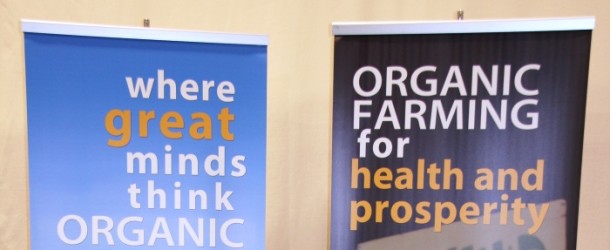The wonderful Kimberly Snyder recently wrote this post and encouraged the sharing of it. It is so critical for us to get information out to as many people as possibly about the potential dangers of genetically modified foods (GMOs).
The Scary Truth About Genetically Modified Foods and What You Should Do
Back in the 90’s seed company Pioneer Hi-Bred added a gene from Brazil nuts to soybeans in order to make the soy more nutritious. Studies showed, however, that consumption of the “improved” soy could trigger anaphylaxis and other allergic responses in humans with a Brazil nut allergy. The project was scrapped.
In 1997, The Scottish Crop Research Institute published research showing that the lives of ladybugs were cut in half and they laid fewer eggs when they fed on aphids that had eatengenetically modified potatoes. This raises concerns about a genetically modified food supply, given the affected animals hadn’t fed on the GM potatoes themselves, but rather they’d eaten something else that had.
These two case studies showcase some of the concerns about genetic modification of crops, something that is occurring in the United States at an alarming rate.
Genetic Modification
Biotechnical engineers may genetically modify foods for a variety of reasons. For example, they may wish to make pest-resistant crops, increase yields, or make fruits firmer so they break down more slowly. Genetically modified foods have been commercially available since 1996. According to the USDA Economic Research Service, in 2011 approximately 81 to 86 percent of all of the planted acres of corn in the country were genetically modified, as well as 87 to 90 percent of all soybean planted acres. Other foods that are either directly GM or affected by genetic modification include rice, soybeans, honey (some Canadian honey may come from bees collecting nectar from GM canola), sugar cane, canola, tomatoes, potatoes, flax, papayas, summer squash, animal proteins, vegetable oils, and dairy products. For example, many people are surprised to learn that hard cheeses utilize genetically created rennet, which traditionally comes from the stomach of calves.
Labeling of genetically modified foods is not currently required by law in the United States unless they contain elements of a highly allergenic food (such as peanut protein), so you are unlikely to know whether the foods you purchase are genetically modified or contain genetically modified ingredients. According to the University of Florida, as much as 60 to 70 percent of consumable products in American food stores contain genetically modified ingredients. Shocking!
Monsanto Seed Controversy
One of the United States’ largest producers of genetically modified seeds for crops is the Monsanto Corporation. The agricultural biotechnology company is responsible for the Roundup Ready seed, genetically engineered seeds that make it easy to drench crops with another Monsanto product, Roundup Herbicide. Monsanto promises farmers that use these Round Up Ready seeds that they will not need to till soil to control weeds, but rather only need to spray crops with the company’s pesticide. The company also suggests that farmers will increase yields and reduce costs associated with crops. Unfortunately, this has led to an onslaught of herbicide-resistant superweeds. To cure this problem, Monsanto suggests using more herbicide, which will ultimately compound the issue and lead to more toxic residues of herbicides in our food supply.
Along with superweeds, Roundup also has been linked to a worldwide decimation of frogs, which naturally control pests without chemicals. Recent research also shows that Roundup herbicide induces tadpoles to change shape. Claims of increased yields from Monsanto’s Roundup Ready seeds also seem to be overblown. In fact, the Soil Association notes that yields from GM crops are lower than, or at best equivalent to, non-GM crops.
For centuries, farmers have harvested their crops, keeping seeds for next year’s planting as part of the harvest. Companies like Monsanto, however, have been slowly buying up the world’s supply of seeds for crops like corn, potatoes, and soybeans. With a growing monopoly on the supply of staple crop seeds, Monsanto is patenting the seeds and suing farmers for piracy if they save them from their harvest to replant the following year. This requires farmers to purchase seeds every year, a practice that raises the price to farm such crops. These types of practices are slowly squeezing out the small farmer, who just can’t afford to keep up with the huge industrial farming operations. It’s beyond evil.
Potential Health Dangers
GM crops have been in use for public consumption for less than two decades. While companies like Monsanto argue that their technologies have been extensively tested, with such a short duration of use it is difficult to know the long-term effects of widespread GM consumption. Potential health risks of GM crops include higher levels of pesticides in foods, higher concentrations of allergens, and other issues.
- Chinese scientists recently found small pieces of rice RNA in the blood and organs of humans who consumed genetically modified rice.
- A 2003 study showed that GM soy altered digestive enzymes in mice.
- Multiple animal studies have linked GMOs to reproductive problems and infant mortality.
Avoiding GM Foods
So how do you avoid genetically modified foods?
- Avoid processed foods that come in cans, bags, boxes and packages because they contain many of the staple crops that are often genetically modified.
- Purchase your produce from local farmers that use organic farming practices and heirloom seeds. You can find local farmers at farmers’ markets and produce stands.
- Choose organic grains from crops less likely to be GM, such as quinoa and millet.
- Eat mostly plant foods, because it is virtually impossible to know what ranchers feed their livestock unless you know the ranchers and can question them.
- Consider growing your own produce.
The more people that aware of this very scary issue that affects all of us, the more we can stand up to it. Please pass this along and help spread the word!!
Image courtesy of Gretchen Tseng

Bravo